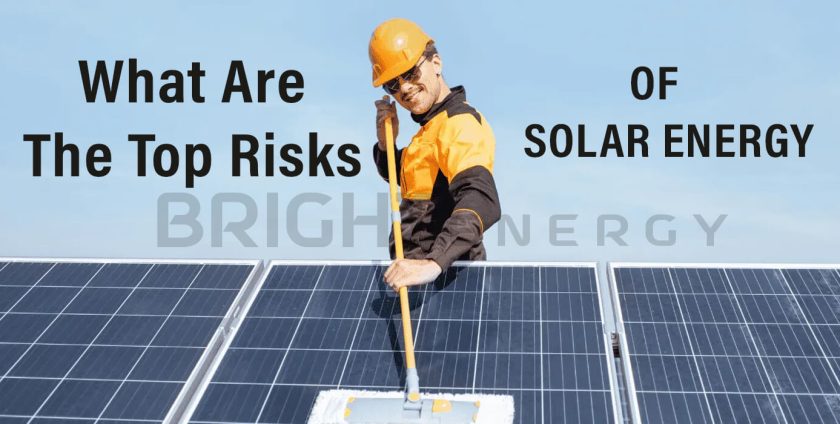
With the increase in the prices of electricity and fuel, it is very difficult for a common Pakistani citizen to live within their previous budget. As the fuel prices are increasing, prices of every other commodity have also increased.
What are The Top Risks of Solar Energy?
People who have enough savings are moving to install solar energy systems to save themselves from at least the monthly electricity bills. But little do they know, solar energy has some risks too.
In this blog, we will discuss some of the top risks of solar energy in Pakistan.
Top Risks of Solar Energy in Pakistan:
- Intermittent Energy Production:
Solar energy production is dependent on sunlight. In regions like Pakistan, where there might be extended periods of overcast days or monsoon seasons, solar energy production can be significantly reduced than normal sunny days.
- Seasonal Variability:
Pakistan experiences significant seasonal variations in sunlight. During winter, days are shorter, the sun’s angle is lower, and fog and smog are present, leading to decreased solar energy production. Monsoon also leads to lower productivity.
In the autumn season, many parts of the country face the problem of “Smog” which has adverse effects on both health and solar energy production. It can affect the overall efficiency and reliability of solar energy systems.
- Dust and Pollution:
Pakistan is known for its high levels of air pollution and dust. Dust accumulation on solar panels can reduce their efficiency. Regular cleaning and maintenance are essential, but this can be challenging in areas with frequent dust storms.
- Water Scarcity for Cleaning:
Water scarcity, which is a significant issue in some regions of Pakistan, can make the regular cleaning of solar panels challenging. As the air is dusty in the majority of regions of Pakistan, dust collects on the panels and lowers the productivity of DC using sunlight. Dirty panels can reduce energy production, leading to financial losses.
- Lack of Infrastructure:
In remote areas or underdeveloped areas, there might be solar panels installed but there is a lack of the necessary infrastructure for solar energy implementation, such as proper grid connections or maintenance services. It can hinder the adoption and maintenance of solar systems.
- Political Instability:
Political instability in any region, including Pakistan, can pose significant risks to the solar energy sector. These risks and challenges include policy inconsistency, lack of investor confidence, delay in projects and their implementation, corruption, funding challenges, and favor for fossil energy. While political instability presents significant challenges, proactive measures such as transparent policies, clear regulations, and international collaborations can help mitigate these risks.
Moreover, investing in diversified energy sources and improving grid infrastructure can enhance the energy sector’s resilience against political uncertainties. Governments, investors, and stakeholders must work together to create a stable and conducive environment for the growth of the solar energy industry in Pakistan despite political challenges
- Regulatory and Policy Challenges:
The solar energy sector in Pakistan might face regulatory challenges and policy inconsistencies. Uncertain policies, lack of incentives, and changing regulations can create an unstable business environment for solar companies and investors.
- High Initial Costs:
The initial investment required for solar energy systems, including solar panels, inverters, and batteries (for off-grid systems), can be high. As per the professional’s advice, people cannot compromise on the quality of the solar energy system’s equipment to increase its lifetime. So the cost is higher for quality equipment and it can deter individuals and businesses from adopting solar technology, especially in regions with economic challenges.
However, many companies are also offering the solar energy system in installments. People need to consult with solar professionals to determine whether installment-based plans will suit them or not.
- Lack of Skilled Workforce:
There might be a shortage of skilled technicians and professionals capable of installing, maintaining, and repairing solar energy systems. As the demand is increasing exponentially, there is an increasing demand for skilled technicians and professionals. This shortage can lead to delays in installation and affect the overall performance of solar projects.
There is a need to train the workforce for labor to make them capable of installing, maintaining, and repairing solar energy systems. Both government and private institutions should play a role in this good cause. It will not only produce skilled labor but also help people to generate income.
- Reliability and Longevity:
The reliability and longevity of some solar equipment, especially if substandard or counterfeit products are used, can be a concern. Poor-quality solar panels or batteries might lead to system failures and financial losses. So there is a need to invest in high-quality and better productivity equipment.
- Security Concerns:
Solar installations, especially in remote or politically unstable areas, might be vulnerable to theft or damage. Ensuring the security of these installations can be a significant challenge.
Despite these risks, it’s important to note that many of them can be mitigated with proper planning, investment in high-quality equipment, regular maintenance, and supportive government policies.
As technology advances and awareness grows, these challenges are expected to diminish, making solar energy an increasingly viable and reliable power source for Pakistan.
For more information, contact Bright Energy for planning to reduce the top risks of solar energy. Our solar professionals will provide a custom-made recommendation for you.
Related Cool Links:
- By: Admin
- Tags: Top Risks of Solar Energy in Pakistan:, What are The Top Risks of Solar Energy?
- 0 comment

Leave a Reply